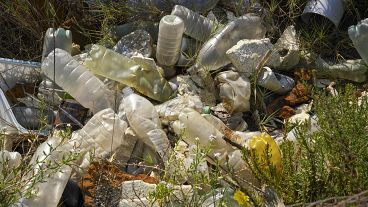Plastic period products are the fifth most common single-use plastic item discovered on European beaches, higher than plastic cups and straws.
As more women seek green alternatives for their period products, a German startup has created biodegradable tampons made of seaweed.
Founded in 2021, Vyld’s tampon named "Kelpon" is made from a biopolymer extracted from marine algae.
This biopolymer is processed into fibres which are then produced in the same way as the traditional tampons.
Vyld tests the quality of the tampon using a Syngina, a device that tests the absorption capacity of tampons.
The team wants to produce innovative, eco-friendly products made from seaweed.
"Our long-term vision is actually the Algaeverse, as you call it, a universe of sustainable products based on seaweed, and the idea of sustainability is absolutely central to this," said Ines Schiller, CEO of Vyld.
Most disposable tampons available on the market are made of cotton or viscose and wrapped in plastic wrappers.
Seaweed is biodegradable and researchers say that like plants, seaweed takes carbon dioxide out of the atmosphere to produce oxygen.
"In principle, they absorb a lot of carbon. But how carbon neutral they are depends on how they're harvested or how they're cultivated," said Laurie Hofmann, a professor of applied marine biology at Bremerhaven University of Applied Sciences.
Vyld says about 100 women tested the product and said it didn’t need a plastic applicator. That’s because seaweed is slimy by nature and remains silky when made into fibres.
"Cotton tends to be a little more difficult to insert and also dries out a little more, and we don't have that. And we owe this to the raw material of the seaweed, which has these positive properties for menstruating women naturally," according to Melanie Schichan, who is Vyld’s head of tampon.
Most women use disposable menstruation products
Some 71 per cent of menstruating women use disposable tampons, according to a survey by German market research company Forsa Institute.
Yet around 41 per cent of women said they would choose reusable menstruation products but have difficulties deciding which product is most suitable for them.
Menstrual sponges have emerged as a popular environmentally friendly period solution.
Schichan says however that menstrual sponges are often made from sea sponges and therefore not vegan.
"When you look at menstrual sponges and then talk about nature, they are creatures, they are animals, and it is very important that we produce vegan products," she said.
"The other natural product is often organic cotton. But here, too, we have a land-based fabric that needs to be bleached. To produce cotton a lot of water but also pesticides are needed but we can produce without".
The fibres from the seaweed biopolymer are naturally white and therefore don’t need to be bleached, according to the German startup.
Currently, they harvest wild seaweed but want to promote seaweed cultivation in Europe.
"Many researchers and companies are already in the process of developing technologies on how we can grow more and better seaweed. And in any case, there are many ways to grow seaweed on land or in the sea or far offshore in the open sea. And that's all developing at the moment," Hofmann explained.
The cover of the tampon is still made out of plastic, but the team says it’s working on seaweed-based biodegradable alternatives.
Plastic period products are the fifth most common single-use plastic item discovered on European beaches, with more of them than plastic cups and straws, according to the European Parliament.
"If we can produce biodegradable sanitary products such as tampons from seaweed, then this obviously has a major advantage. Simply to reduce waste," said Hofmann.



